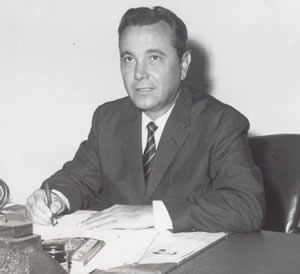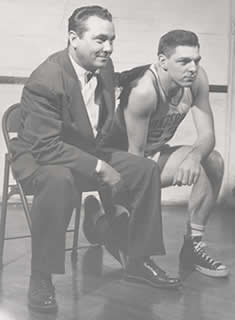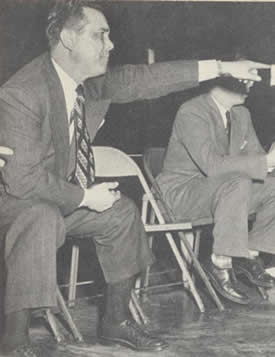Jan. 3, 2007
CHC- Bob Polk (pdf) | CHC Archive
February 27, 1947 was a date that began major changes in the Vanderbilt basketball program. Adolph Rupp’s Kentucky Wildcats smashed the Commodores 98-29 in the SEC Tournament held that year in Louisville.
 |
|
Legendary VU Basketball Coach Bob Polk |
Attending that humiliating game for Vanderbilt was athletics director and head football coach Red Sanders. Sanders came back to Nashville realizing he needed better players, a gymnasium and a new full-time basketball coach. In the past, Vanderbilt’s basketball coaches were usually former basketball players or assistant coaches from other sports.
After interviewing several candidates, a Georgia Tech assistant coach named Bob Polk was hired. Before Polk’s arrival on the Vanderbilt campus, games were held at area high schools. Practices were held at the Old Gym Annex located on the campus.
Polk was paid a controversial five thousand dollars a year in salary. He also secured a quonset hut on Thompson Lane for home games, which was the Navy Classification Center. Polk was also assured that plans would be made for a new gymnasium. Polk sold 16 season tickets that first year and personally chalked numbers in front of the season ticket holder’s seats.
Another mission for Polk was to find scholorship basketball players, which Vanderbilt never offered in that sport. Polk dipped into his home state of basketball-crazed Indiana to sign Gene Southwood, Jack Heldman and Dave Kardokus. Sanders had secured Nashville’s West High School’s Billy Joe Adcock as the Commodore’s first basketball-only scholarship player before Polk’s arrival.
Polk’s first season resulted in an 8-14 (SEC, 4-11) record, his only losing season at Vanderbilt. The next year his team was 14-8 (SEC, 9-5) losing to Kentucky 72-50 in Nashville and 70-37 at Kentucky.
Now that his first scholarship players were experienced, Vanderbilt gained national attention in 1949 with an overtime 65-50 victory over New York University at Madison Square Garden. The Commodores completed that 1949-50 season at 17-8 and second place (11-3) in the SEC. Vanderbilt lost twice to Kentucky that season by scores of 58-54 and 70-66. Progress had been made.
Other players to become Commodores in Polk’s first few years were Bob Dudley Smith, Hank Duvier, George Kelly, Haworth Parks, and Pete Robinson. Adcock graduated after the 1949-50 season and became Vanderbilt’s first All-American basketball player.
 |
|
Polk (left) pictured with Bob Dudley Smith |
With Kelly as team captain, the Commodores would finish the 1950-51 season at 19-8 and once again tied for second place (10-4) in the SEC. At this time, David Lipscomb’s McQuiddy Gym was home to Vanderbilt. The Commodores also loss both of their scheduled regular season games to Kentucky 74-49 and 89-57. The previous year the Commodores, with their No. 2 seed, were ousted from the SEC Tournament by Tennessee.
During the 1951 SEC Tournament in Louisville, Vanderbilt rolled by Tennessee, Georgia and LSU before playing Kentucky for the championship. The Wildcats had a super team with a great height advantage led by seven foot All-American center Bill Spivey. Other talented `Cat players on the roster were Frank Ramsey, Walt Hirsch, Bobby Watson and Cliff Hagan. Kentucky entered the tournament with a record of 27-1 (SEC, 14-0) and a No. 1 national ranking. Future Vanderbilt coach C.M. Newton was a substitute on that squad.
The Wildcats jumped out to an early lead, but Vanderbilt kept it close trailing at the half, 30-26. The Commodores trailed by 10 points in the second half before 7,000 fans who were mostly UK fans. But with 10 minutes to play in the game, Vanderbilt cut the lead to 48-47.
The lead would swap between teams until Kelly hit two free throws late in the game for a hard-fought 61-57 Commodore victory. It was such a huge upset that the championship trophy was already engraved with Kentucky as champions. The NCAA rule required the regular season champion of a conference to advance to the national tournament. Polk let his team vote whether to accept a post-season tournament if invited, but they declined. Kentucky continued on to become national champions in 1951.
The SEC Tournament was disbanded after the next season, but revived in 1979. The Commodores 1951 SEC Tournament championship is their only crown in either era.
The permanent home court promised Polk by the university became reality in 1952. Memorial Gymnasium played its first game that year in December against the University of Virginia. Vanderbilt won, 90-83. In Polk’s eight years coaching in Memorial Gym, he recorded an amazing 96-15 mark.
During a recruiting trip in the fall of 1958, Polk was in Paducah, Kentucky when he became ill. Polk had a massive heart attack and spent three months in a Paducah hospital recuperating. When Polk returned to Nashville, he was bed-ridden. Forced to miss the 1958-59 season, his young assistant coach Roy Skinner became the interim.
Polk was back the next season with such players as Bobby Bland, Bill Depp, Bill Johnson and Ben Rowan. They would end the season at 14-9 (SEC, 7-7) with Depp and Rowan named to the All-SEC team.
One funny, but degrading moment came in Lubbock, Texas with Texas Tech. From the book Dynamite! 75 Years of Vanderbilt Basketball, Vanderbilt radio broadcaster Larry Munson gave this account of the incident:
“This one’s going down to the wire, folks. Hang on. We’ve got Gish coming into the game. It’ll be Vandy’s ball out of bounds. Wait a minute. What’s this? Gish has lost his pants! Bob Polk has pulled off Lance Gish’s pants in front of six thousand screaming fans! The place is going crazy.”
 |
|
Bob Polk finsihed with a 197-106 record at VU. |
In the excitement of the game, Polk was helping Gish out of his warm-up pants and accidentally grabbed his shorts in addition. The embarrassed Gish did make a pair of crucial free throws to help the Commodores win the game by two points.
Vanderbilt basketball was now more successful than the once prominent football program. Since the 1955 Gator Bowl, Commodore football was declining with more and more losses. Polk had brought such prominence to basketball that every year his clubs were SEC championship contenders and droves of fans were packing Memorial Gym.
In the summer of 1961, Polk’s doctors told him the he needed to give up the stress of coaching. Due to his poor health, the 47-year-old Polk retired as the Commodores’ basketball coach and became the personnel director at Vanderbilt Hospital. Skinner took over the head coaching duties.
The Bob Polk era at Vanderbilt was over. He retired from Vanderbilt with a 197-106 record in 13 seasons. When Polk retired, he was easily Vanderbilt’s all-time winningest coach. Skinner would retire in 1976 after 16 years of coaching the Commodores to a 276-135 record.
Polk was only out of basketball for 18 months as he health steadily improved. In 1965 he found himself at Trinity College in San Antonio, Texas. In the duo role of head basketball coach and athletics director, Polk became Southland Conference Coach-of-the-Year in 1967. He was also the NCAA National Coach-of-the-Year for the small college division in 1968. In his three years at Trinity, Polk compiled a 69-28 record.
Polk moved to Saint Louis University (1969-74) to become head basketball coach and assistant professor. In 1971, Polk was named the Coach-of-the-Year in the Missouri Valley Conference. His overall record for the Billikens was 72-60.
Rice was his next coaching stop in 1974, but retired from coaching altogether in June 1977 after a three-year record of 17-63. Polk moved to Birmingham in September to become assistant athletics director at the University of Alabama-Birmingham under Gene Bartow. He remained in that position until November 1981 when another heart attack forced his permanent retirement.
Polk passed away on March 18, 1986 at the Veterans Administration Medical Center in Murfreesboro, TN at age 71. The father of modern Vanderbilt basketball was buried in Tell City, Indiana. Polk was inducted into the Tennessee Sports Hall of Fame in 1990.
Next week read about Vanderbilt’s upset of New York University in 1949 at the Madison Square Garden.
Traughber’s Tidbit: One of the applicants that Red Sanders interviewed before hiring Bob Polk was John Wooden. Wooden was coaching at Indiana State at the time. He later became the one of the greatest college basketball coaches in history. At UCLA (1948-75), Wooden amassed a 620-147 record with 19 PAC-10 championships and 10 national championships.
If you have any comments or suggestions you can contact Bill Traughber via e-mail WLTraughber@aol.com.

